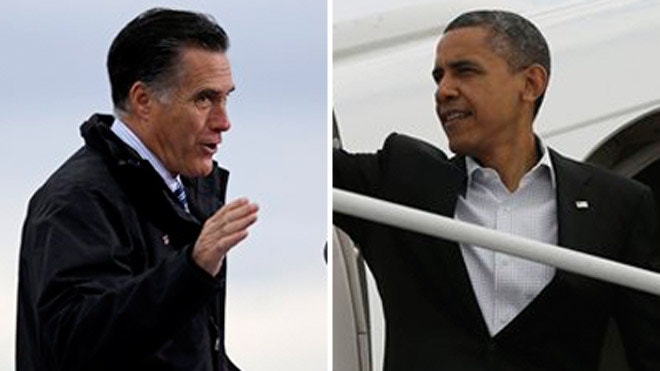 Mitt Romney and President Obama blazed across the country Saturday, hitting key battleground states where both candidates vowed partisan compromise if elected and urged supporters to help them win over the remaining undecided voters.
Mitt Romney and President Obama blazed across the country Saturday, hitting key battleground states where both candidates vowed partisan compromise if elected and urged supporters to help them win over the remaining undecided voters.
The promises for compromise in Washington were an attempt to appeal to Independent voters who could swing the tight race now in its final three days.
“I need you to reach across the lawn to the neighbor with the other (campaign) sign,” Romney said at a rally in Colorado, his third of four Saturday. “I’ve got to reach across the aisle. Walk with me. We can do this.”
Romney began the day with an outdoor rally in New Hampshire, then made a stop in Iowa before attending the rally in Colorado Spring. His finally rally of the day will be in Englewood, Colo.
President Obama made similar arguments during his stops -- Ohio, Wisconsin, Iowa, then Virginia in the evening.
The president told the crowd in Ohio: "I'll work with any party to make this country move forward. If you want to break the gridlock of Congress, vote for me."
He also took a jab at what he sees as the Romney plan for White House-Capitol Hill compromises -- agreements to cut funding to Planned Parenthood, health care and student financial aid.
"I’m not going to have that," the president said inside a school gymnasium in Mentor, Ohio. "That's not bipartisanship. … Knock on some doors with me, make some calls for me."
In Wisconsin, the president delivered similar remarks but added some star power -- singer Katy Perry, who wore a shiny blue mini dress with the word “Forward” across the top and sang into a microphone that looked like the Statue of Liberty torch.
In Iowa, the president referred to the fatal, devastating superstorm Sandy to make his point about working together.
“We are in this together,” he said in Dubuque, Iowa. “We will rise and fall as one nation.”
The president began the day with an early-morning meeting at the Federal Emergency Management Agency headquarters to discuss relief efforts for the Sandy victims.








